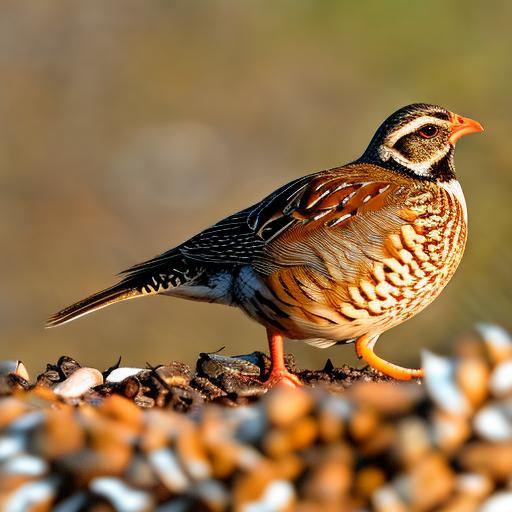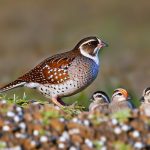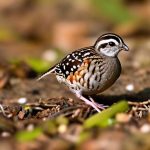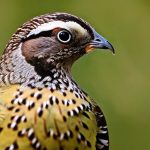Quail are social birds that thrive in flocks, and understanding their behavior is crucial for providing them with a suitable environment. They are known for their quick movements and skittish nature, which is a natural defense mechanism against predators. Quail are also known for their pecking behavior, which is a way for them to establish dominance within the flock. It’s important to note that quail are territorial birds and can become aggressive if they feel their space is being invaded. Understanding these behaviors can help in creating a harmonious environment for the quail to thrive.
Quail are also known for their strong social bonds within the flock. They have a complex communication system that involves various vocalizations and body language. They rely on each other for safety and companionship, and disrupting their social structure can lead to stress and aggression. Understanding the social dynamics within the flock is essential for providing them with a suitable living space. By observing their behavior and interactions, it’s possible to create an environment that promotes their natural instincts and allows them to live harmoniously.
Key Takeaways
- Quail are social birds and thrive in groups, but can also display aggressive behavior if overcrowded or stressed.
- Providing ample space, hiding spots, and resources like food and water can help reduce competition and aggression among quail.
- Establishing a pecking order within the flock can help minimize aggression and maintain harmony among the birds.
- Adding distractions and enrichment such as perches, toys, and foraging opportunities can keep quail engaged and reduce stress and aggression.
- Regularly monitoring the quail for signs of aggression or stress and addressing any issues promptly is crucial for their well-being.
- Using deterrents and barriers like visual barriers or anti-pecking sprays can help prevent pecking and aggression among quail.
- Seeking professional advice and support from a veterinarian or experienced quail keeper can be beneficial in managing and resolving aggression and stress in quail.
Providing enough space and resources for quail
Quail require ample space to move around and establish their territories within the flock. Overcrowding can lead to stress and aggression, as they compete for space and resources. Providing a spacious living area with plenty of room for them to roam and establish their pecking order is essential for their well-being. Additionally, ensuring that there are enough resources such as food, water, and nesting areas is crucial for maintaining a harmonious environment. Lack of resources can lead to competition and aggression within the flock.
In addition to space, providing suitable shelter is important for the well-being of quail. They require protection from predators and the elements, as well as a safe place to rest and lay eggs. Creating a suitable environment with adequate shelter and resources can help in preventing stress and aggression within the flock. By meeting their basic needs, quail can thrive in their environment and exhibit natural behaviors without the added stress of competition for resources.
Establishing a pecking order within the flock
Pecking order is a natural behavior in quail that helps establish hierarchy within the flock. It’s important to allow them to establish this order without interference, as it helps maintain stability and reduce aggression within the group. The pecking order determines access to resources such as food, water, and nesting areas, and interfering with this natural process can lead to stress and aggression within the flock.
Understanding the dynamics of the pecking order can help in creating a suitable environment for quail. Providing multiple feeding and watering stations can help reduce competition and allow lower-ranking birds to access resources without being bullied by higher-ranking individuals. Additionally, providing ample space for them to establish their territories can help reduce conflicts within the flock. By allowing them to establish their natural hierarchy, it’s possible to create a harmonious environment where they can thrive without the added stress of constant competition.
Adding distractions and enrichment to the quail’s environment
Adding distractions and enrichment to the quail’s environment can help reduce stress and aggression within the flock. Providing toys, perches, and hiding spots can help keep them mentally stimulated and prevent boredom, which can lead to aggressive behavior. Additionally, introducing novel objects and treats can help redirect their focus and reduce tension within the group.
Creating a stimulating environment with various enrichment activities can help promote natural behaviors and reduce stress in quail. Foraging toys, dust baths, and live insects can provide mental and physical stimulation, keeping them engaged and content. By adding distractions and enrichment to their environment, it’s possible to create a harmonious living space where they can exhibit natural behaviors without the added stress of boredom or frustration.
Monitoring and addressing any signs of aggression or stress
Monitoring the behavior of quail is essential for identifying any signs of aggression or stress within the flock. Aggressive behaviors such as pecking, chasing, or feather plucking can indicate underlying issues that need to be addressed. Additionally, signs of stress such as decreased appetite, lethargy, or excessive vocalization should be taken seriously and addressed promptly.
Addressing any signs of aggression or stress in quail requires careful observation and intervention. Separating aggressive individuals, providing additional resources, or adjusting the living environment can help reduce tension within the flock. Additionally, addressing any underlying health issues or environmental stressors is crucial for maintaining the well-being of the quail. By monitoring their behavior closely and addressing any signs of aggression or stress, it’s possible to create a harmonious living space where they can thrive without the added tension of conflict.
Using deterrents and barriers to prevent pecking
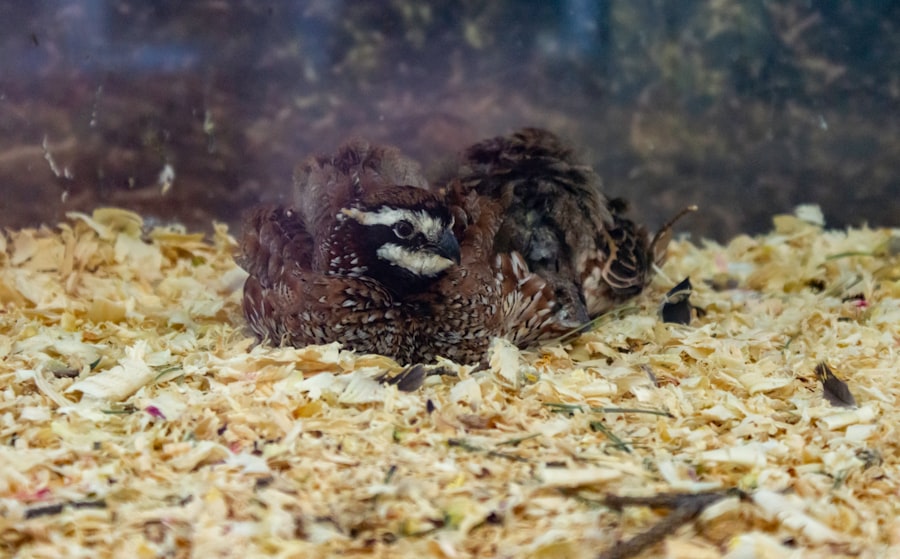
Using deterrents and barriers can help prevent pecking and aggression within the flock. Providing hiding spots, visual barriers, or separate feeding stations can help reduce conflict and allow lower-ranking individuals to access resources without being bullied by higher-ranking birds. Additionally, using deterrents such as bitter-tasting sprays or noise devices can help discourage aggressive behavior within the group.
Creating a living environment with barriers and deterrents can help reduce tension within the flock and promote harmonious interactions. By providing separate spaces for individuals to retreat to and access resources without interference, it’s possible to create a peaceful living space where they can coexist without the added stress of constant competition.
Seeking professional advice and support if necessary
Seeking professional advice and support is crucial if there are ongoing issues with aggression or stress within the quail flock. Consulting with a veterinarian or avian behavior specialist can help identify underlying issues and develop a suitable management plan for the group. Additionally, reaching out to experienced quail breeders or enthusiasts can provide valuable insights and support in creating a harmonious living environment for the birds.
Professional advice and support can provide valuable guidance in addressing complex behavioral issues within the quail flock. By seeking expert assistance, it’s possible to develop a management plan that addresses the specific needs of the birds and promotes harmonious interactions within the group. Additionally, professional support can provide reassurance and guidance in creating a suitable living environment that meets the natural needs of quail while minimizing stress and aggression within the flock.
If you’re struggling with quail pecking each other, it’s essential to create a harmonious environment for your birds. In addition to addressing pecking behavior, it’s crucial to consider the overall setup of your coop. Ensuring the right coop door size can make a significant difference in the well-being of your poultry. For more insights on optimizing your coop, check out this informative article on poultrywizard.com.
FAQs
What are some reasons why quail peck each other?
Quail may peck each other due to overcrowding, lack of space, stress, boredom, or hierarchy establishment within the flock.
How can I prevent quail from pecking each other?
To prevent quail from pecking each other, provide enough space in the enclosure, ensure proper nutrition, offer environmental enrichment such as perches and hiding spots, and monitor the flock for any signs of aggression.
What are some signs of pecking and aggression in quail?
Signs of pecking and aggression in quail include feather loss, injuries, stress, and a decrease in egg production. It’s important to observe the behavior of the quail and address any signs of aggression promptly.
Are there any specific breeds of quail that are less prone to pecking behavior?
Some quail breeds may be less prone to pecking behavior than others, but individual temperament and environmental factors play a significant role in the behavior of the flock. It’s important to provide a suitable environment for all quail breeds to minimize pecking behavior.
What should I do if I notice quail pecking each other?
If you notice quail pecking each other, take immediate action to address the issue. This may include separating aggressive individuals, providing more space or environmental enrichment, and ensuring that the quail have a balanced diet. If injuries are present, seek veterinary care for the affected quail.
Meet Walter, the feathered-friend fanatic of Florida! Nestled in the sunshine state, Walter struts through life with his feathered companions, clucking his way to happiness. With a coop that’s fancier than a five-star hotel, he’s the Don Juan of the chicken world. When he’s not teaching his hens to do the cha-cha, you’ll find him in a heated debate with his prized rooster, Sir Clucks-a-Lot. Walter’s poultry passion is no yolk; he’s the sunny-side-up guy you never knew you needed in your flock of friends!

